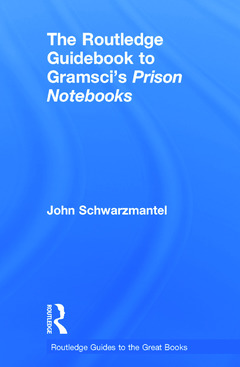The Routledge Guidebook to Gramsci's Prison Notebooks The Routledge Guides to the Great Books Series
Auteur : Schwarzmantel John

Gramsci?s Prison Notebooks are one of the most important and original sources of modern political philosophy but the Prison Notebooks present great difficulties to the reader. Not originally intended for publication, their fragmentary character and their often cryptic language can mystify readers, leading to misinterpretation of the text. The Routledge Guidebook to Gramsci?s Prison Notebooks provides readers with the historical background, textual analysis and other relevant information needed for a greater understanding and appreciation of this classic text. This guidebook:
- Explains the arguments presented by Gramsci in a clear and straightforward way, analysing the key concepts of the notebooks.
- Situates Gramsci?s ideas in the context of his own time, and in the history of political thought demonstrating the innovation and originality of the Prison Notebooks.
- Provides critique and analysis of Gramsci?s conceptualisation of politics and history (and culture in general), with reference to contemporary (i.e. present-day) examples where relevant.
- Examines the relevance of Gramsci in the modern world and discusses why his ideas have such resonance in academic discourse
Featuring historical and political examples to illustrate Gramsci's arguments, along with suggestions for further reading, this is an invaluable guide for anyone who wants to engage more fully with The Prison Notebooks
1. Gramsci before the Prison Notebooks 2. Nature and structure of the Prison Notebooks 3. Intellectuals and Education 4. History and Modernity 5. Politics, State, and Civil Society 6. Philosophy and Marxism 7. The afterlife and influence of Gramsci’s Prison Notebooks
John Schwarzmantel is Visiting Research Fellow in the School of Politics and International Studies, University of Leeds
Date de parution : 01-2015
12.9x19.8 cm
Date de parution : 01-2015
12.9x19.8 cm
Thème de The Routledge Guidebook to Gramsci's Prison Notebooks :
Mots-clés :
Antonio Santucci; Quintin Hoare and Geoffrey Nowell-Smith; hegemony; passive revolution; war of position; Marxism; Benedetto Croce; Quaderni del carcere Valentino Gerratana; Joseph Buttigieg; new order; Ordine Nuovo; Italian History; Americanism and Fordism; Italian Risorgimento; Action Party; Moderates; The Modern Prince; State and Civil Society; collective man; uomo collettivo; consumerism; The Philosophy of Praxis; The Theory of Historical Materialism; 3B2 Version; individualism; Prison Notebooks; Civil Society; Gramsci’s Prison Notebooks; Contemporary Society; Napoleon III; Gramsci’s Views; Economic Corporate Level; Political Party; Gramsci’s Analysis; International Monetary Fund; Ethico Political History; Special Notebooks; Biennio Rosso; Gramsci Notes; Factory Council Movement; Lo Piparo; Factory Councils; John Cammett; Gramsci Writes; Quaderni Del Carcere; San Vittore



